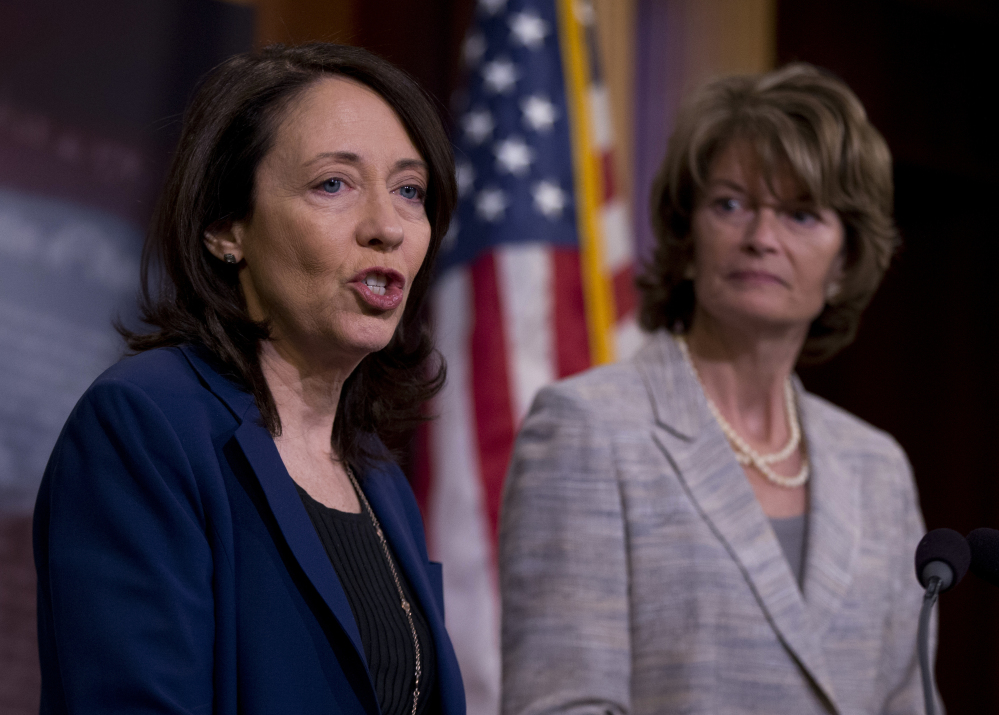WASHINGTON — The Senate overwhelmingly approved a far-reaching energy bill Wednesday that reflects significant changes in U.S. oil and natural gas production over the past decade and boosts alternative energy sources such as wind and solar power.
The bill also would speed federal approval of projects to export liquefied natural gas to Europe and Asia, where prices are higher than in the U.S. following a yearlong boom in domestic gas production.
With its 85-12 vote, the Senate backed its first ambitious energy bill in nearly a decade.
Both of Maine’s senators, Susan Collins, a Republican, and Angus King, an independent, voted with the majority.
Sen. Lisa Murkowski, an Alaska Republican and chairwoman of the Senate Energy and Natural Resources Committee, said the bill represented “energy modernization” on a broad scale, reflecting almost a decade’s worth of changes in technologies and markets in the energy sector.
“Moving forward with this act will help America produce more energy, help Americans save more money and bring us one step closer to becoming a global energy superpower,” Murkowski said.
The bill would boost renewables such as solar and wind power, as well as hydropower, geothermal energy and even critical minerals such as cobalt, beryllium and lithium that are used in cell phones, computers and other electronics.
The bill also would encourage so-called clean-coal technology, including projects to capture carbon dioxide generated by coal-fired power plants, and increase public-private partnerships to develop advanced nuclear technologies.
The measure now must be reconciled with a House-passed version that boosts fossil fuels such as oil, coal and natural gas. President Obama has threatened to veto the House measure.
Sen. Maria Cantwell of Washington state, the senior Democrat on the energy panel, called energy “the lifeblood of our economy” and said the Senate bill would push the nation toward “cleaner, more efficient, more cost-effective and renewable energy sources.”
Congress last approved broad energy measures in 2005 and 2007, during the George W. Bush administration.
Since then, the U.S. energy landscape has changed dramatically, as improved drilling techniques, including hydraulic fracturing, have sparked a yearslong boom that has pushed the United States toward becoming the world’s top producer of oil and natural gas.
The catch-all bill would update building codes to increase efficiency, strengthen electric-grid safety standards and reauthorize a half-billion-dollar conservation fund that protects parks and other public lands.
Despite the overwhelming vote, the Senate bill drew opposition across the political spectrum.
The conservative Heritage Foundation denounced the bill as a “continuation of government meddling in the energy economy” that would direct federal money toward politically preferred technologies such as wind and solar power and even nuclear energy.
The Sierra Club, the nation’s largest environmental group, said the bill would “boost dirty fossil fuels” such as coal and natural gas and encourage “dangerous nuclear projects” while undermining Obama’s Clean Power Plan to curb greenhouse gas emissions from coal-fired power plants.
Murkowski and Cantwell said they were confident that Senate and House negotiators would agree on a compromise bill this year.
Rep. Fred Upton, R-Mich., chairman of the House energy panel, also was optimistic. The Senate vote brought Congress “one step closer to embracing policies that say yes to energy,” he said.
While Cantwell and Murkowski are ideological opposites, the two women said in an interview that their joint status representing the Pacific Northwest brought them together.
Send questions/comments to the editors.



Success. Please wait for the page to reload. If the page does not reload within 5 seconds, please refresh the page.
Enter your email and password to access comments.
Hi, to comment on stories you must . This profile is in addition to your subscription and website login.
Already have a commenting profile? .
Invalid username/password.
Please check your email to confirm and complete your registration.
Only subscribers are eligible to post comments. Please subscribe or login first for digital access. Here’s why.
Use the form below to reset your password. When you've submitted your account email, we will send an email with a reset code.